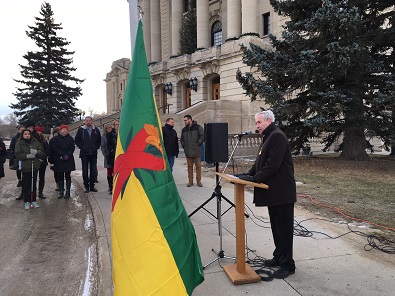Photo courtesy of Manfred Joehnck
Saskatchewan still has the highest HIV infection rate in Canada.
This morning, the province released its annual HIV AIDS Report, which shows a 6 per cent increase in the number of new infections last year, with 79 per cent of them in the Aboriginal community.
This morning, a flag was raised at the legislative building during International AIDS Awareness Day, and stakeholders reflected on the growing crisis in Saskatchewan.
There were 170 new infections last year, up 10 from the previous year. Since 1985, there have been nearly 2,100 cases, with more than three quarters of them in the Indigenous community. Saskatchewan’s infection rate is 2.3 times the national average.
Sharing dirty needles among drug users is the number one cause of infection at 60 per cent, followed by heterosexual sex at 32 per cent.
Sex among gay men accounted for only 4 per cent of the new infections last year. Margaret Poitras, the CEO of the All Nations Hope Network, says organizations like hers need to lead the way in reducing the numbers.
“Indigenous people have to lead this movement in order for it to be effective and to address what we are seeing in our communities with HIV positive people who are Indigenous,” she said.
While the overall numbers were up 6 per cent in Saskatchewan, the Sunrise Health Region, which includes the Cote, Key and Keeseekoose First Nations, saw an increase of 260 per cent. The Prairie North Health Region in northern Saskatchewan reported the second highest increase at 83 per cent.
Jason Mercredi, the executive director of AIDS Saskatoon, says this should be considered a health crisis.
“If this was any other infectious disease we could be hitting the panic button right now trying to get the federal government to really address this issue,” he said.
HIV numbers in Regina were down 12 per cent from the previous year, while Saskatoon recorded a 22 per cent decrease. Still, the two cities have the majority of HIV patients in the province.
There was some other good news in the numbers as well. Even though 44 HIV positive women gave birth last year, none of the babies were infected.
